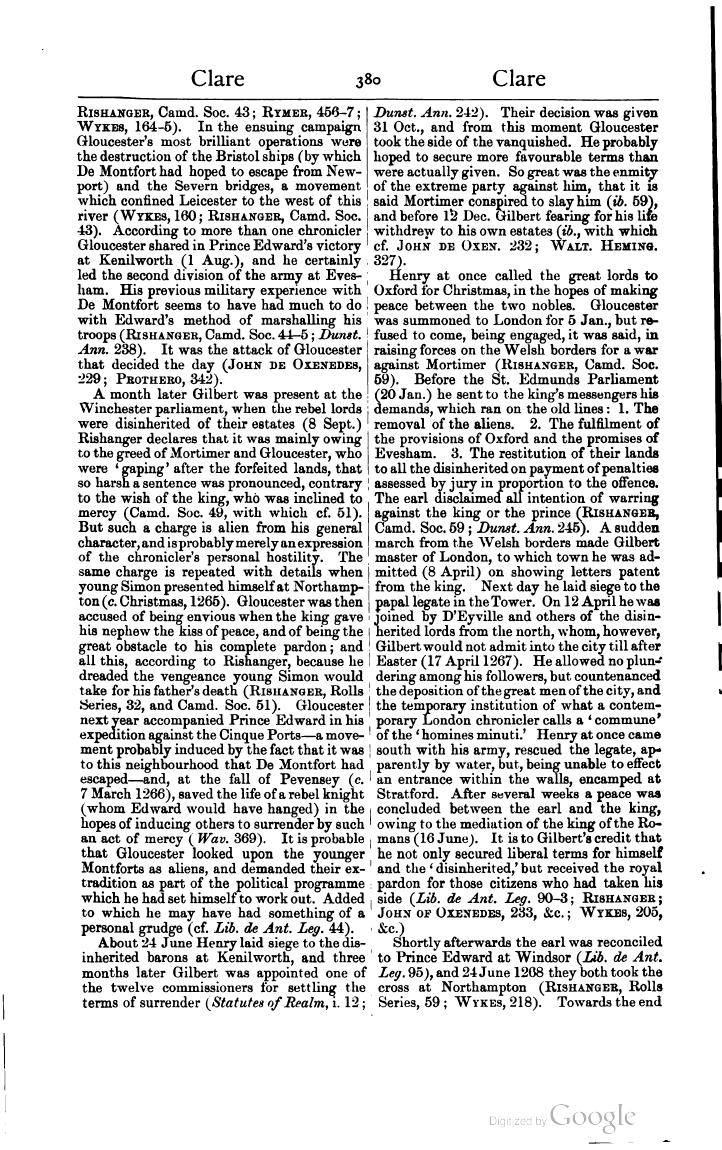Rishanger, Camd. Soc. 43; Rymer, 456-7; Wykes, 164-5). In the ensuing campaign, Gloucester’s most brilliant opierations were; the destruction of the Bristol ships (by which De Montfort had hoped to escape from Newport) and the Severn bridges, a movement which confined Leicester to the west of this river (Wykes, 160; Rishanger, Camd. Soc. 43). According to more than one chronicler Gloucester shared in Prince Edward’s victory at Kenilworth (1 Aug.), and he certainly, led the second division of the army at Evesham. His previous military experience with De Montfort seems to have had much to do with Edward’s method of marshalling his troops (Rishanger, Camd. Soc. 44-5; Dunst. Ann. 288). It was the attack of Gloucester that decided the day (John de Oxenedes, 229; Prothero, 342).
A month later Gilbert was present at the Winchester parliament, when the rebel lords were disinherited of their estates (8 Sept.) Rishanger declares that it was mainly owing to the greed of Mortimer and Gloucester, who were ‘gaping’ after the forfeited lands, that so harsh.; sentence was pronounced, contrary 'to the wish of the king, who was inclined to mercy (Camd. Soc. 49, with which cf. 51). But such a charge is alien from his general character, and is probably merely an expression of the chronicler's personal hostility. The same charge is repeated with details when young Simon presented himself at Northampton (c. Christmas, 1265). Gloucester was then accused of being envious when the king gave his nephew the kiss of peace, and of being the great obstacle to his complete pardon: and all this, according to Rishanger, because he dreaded the vengeance young Simon would take for his father's death (Rishanger, Rolls Series, 32, and Camd. Soc. 51). Gloucester next year accompanied Prince Edward in his expedition against the Cinque Ports-a movement probably induced by the fact that it was to this neighbourhood that De Montfort had escaped-and, at the fall of Pevensey (c. 7 March 1266), saved the life of a rebel knight (whom Edward would have hanged) in the hopes of inducing others to surrender by such an act of mercy (War, 369). It is probable that Gloucester looked upon the younger Montforts as aliens. and demanded their extradition as part of the political programme which he had set himself to work out. Added to which he may have had something of a personal grudge (cf. Lib. de Ant. Leg. 44).
About 24 June Henry laid siege to the disinherited barons at Kenilworth, and three months later Gilbert was appointed one of the twelve commissioners for settling the terms of surrender (Statutes of Realm, i. 12: Dunst. Ann. 242). Their decision was given 31 Oct., and from this moment Gloucester took the side of the vanquished. He probably hoped to secure more favourable terms than were actually given. So great was the enmity of the extreme party against him, that it is said Mortimer conspired to slay him (ib. 532, and before 12 Dec. Gilbert fearing for his life withdrew to his own estates (ib, with which cf. John de Oxen. 232; Walt. Heming. 327).
Henry at once called the great lords to Oxford for Christmas, in the hopes of making peace between the two nobles. Gloucester was summoned to London for 5 Jan., but refused to come, being engaged, it was said, in raising forces on the Welsh borders for a war against Mortimer (Rishanger, Camd. Soc. 59). Before the St. Edmunds Parliament (20 Jan.) he sent to the king's messengers his demands, which ran on the old lines: 1. The removal of the aliens. 2. The fulfilment of the provisions of Oxford and the promises of Evesham. 3. The restitution of their lands to all the disinherited on payment of penalties assessed by jury in proportion to the offence. The earl disclaimed all intention of warring against the king or the prince (Richanger, Camd. Soc. 59; Dunst. Ann. 245). A sudden march from the Welsh borders made Gilbert master of London, to which town he was admitted (8 April) on showing letters patent from the king. Next day he laid siege to the papal legate in the Tower. On 12 April he was joined by D'Eyville and others of the disinherited lords from the north, whom, however, Gilbert would not admit into the city till after Easter (17 April 1267). He allowed no plundering among his followers, but countenanced the deposition of the great men of the city, and the tempprary institution of what a contemporary ndon chronicler calls a ‘commune’ of the ‘homines minuti.’ Henry at once came south with his army, rescued the legate, apparently by water, but, being unable to effect an entrance within the walls, encamped at Stratford. After several weeks a peace was concluded between the earl and the king, owing to the mediation of the king of the Romans (16 June). It is to Gilbert's credit that he not only secured liberal terms for himself and the 'disinherited,’ but received the royal pardon for those citizens who had taken 'his side (Lib. de Ant. Leg. 90-3; Rishanger; John of Oxenedes, 233, &c.: Wykes, 205, &c.)
Shortly afterwards the earl was reconciled to Prince Edward at Windsor (Lib. de Ant. Leg. 95), and 24 June 1268 they both took the cross at Northampton (Rishanger, Rolls Series. 59; Wykes, 218). Towards the end
